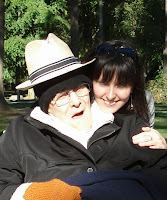Along with wearing dentures, losing your driving licence, becoming incontinent and living with dementia, immobility is right up there in most people’s vision of what ‘being old’ is like. It’s a hugely stigmatised view of course, since many people live a very long life without encountering any of these problems. Indeed I once knew a lady in her 90’s who was still driving her little Mini around, was perfectly able to get to the toilet when she required it, still had all her own teeth, and most definitely didn’t have dementia.
Nevertheless, the image of the older person with their walking stick or zimmer frame looms large in most people’s vision of ageing and indeed of living with dementia. It is worth pointing out, however, that I’ve known many people who never really had mobility problems during their years with dementia, and only became confided to bed when they became ill with an infection that they died from shortly afterwards.
Supporting mobility is a key aspect of helping a person to live well with dementia. The exercise is good for their general health, the independence is good for their mind, and mobility ensures a sense of normality is retained when many other aspects of their life may be changing. That’s not to say that being mobile doesn’t present risks, particularly around the desire to walk a lot (as I wrote about here) and the potential for falls and accidents that can result in broken bones, cuts and bruises. All of these can take a longer to heal for an older person, and if a hip is seriously broken it can be a threat to someone’s life.
These risk factors often lead to worries about a person’s safety and security if their mobility is actively encouraged, but we shouldn’t become too risk adverse. Mobility is vital part of a person’s life that as families and professionals we should make sure we support. Keeping people seated or in bed simply to protect them from the potential for injury is likely to do a huge amount of harm to their physical and mental wellbeing, and even more so if restraints are used.
Seeing immobility as some kind of cosy cotton wool world is totally inaccurate. If someone becomes immobile it produces a whole range of added problems, most notably around pressure sores and increased risk of infections. My father had far more chest infections when he became immobile, and his GP was firmly of the belief that his lack of movement was contributing to his inability to effectively remove the secretions from his airways. Imagine being unwell with chest, bladder or stomach problems and unable to move – a fairly unpleasant thought for anyone to contemplate.
Maintaining an individual’s mobility when they are living with dementia does, however, produce challenges. If a person becomes unsteady on their feet and requires a walking aid, trying to support them to learn how to use that correctly can be very difficult. Keeping people mobile if they are beginning to struggle with independent mobility also requires a huge amount of commitment from professionals and/or family members.
In care settings, including hospitals, you need high staffing levels to ensure that there is enough support to help people to move around. Movement often takes time and patience and cannot be rushed. In almost every care setting there are never enough physiotherapists, occupational therapists and indeed supporting care staff who are ready, willing and able to help someone to walk down the corridor, go to the loo or indeed venture further.
Even if an individual does eventually become immobile, that doesn’t mean that they should be dumped in a room and left there all day, or excluded from events or activities simply because no one has time to give them the opportunity to move. One of the big problems in my dad’s care home was always the lack of wheelchairs; you would often have to beg and borrow in order to find a wheelchair for him to be moved from his room. It would be utterly unacceptable for someone to not have clean clothes or food in a care home, but apparently it’s perfectly acceptable to restrict their chance to move around just because they are unable to walk anymore.
Immobility has huge implications for a person’s quality of life. It can affect the opportunities they have for engagement, fun, new experiences and environments, and the pursuit of hobbies and interests. It is also likely to affect emotions, often producing frustration, anger or boredom. Indeed, whenever you feel someone who is immobile is producing ‘challenging behaviour’ ask yourself how you might feel in their circumstances. Some people can even lose the will to live through immobility.
For many years the Paralympic movement has shown us what people can do when they are restricted by mobility or movement (see my blog on the positive approach of Paralympians), yet we often see older people, people living in care homes and particularly people with dementia, assume immobility is a natural part of their life and simply give up on helping them to maintain their mobility. I’m not suggesting our older generations are likely to want to become Olympians (well you never know!), but they should be given every opportunity to keep moving, however much they can and for as long as they can. After all, wouldn’t you want the same chance afforded to you?
You can follow me on Twitter: @bethyb1886





